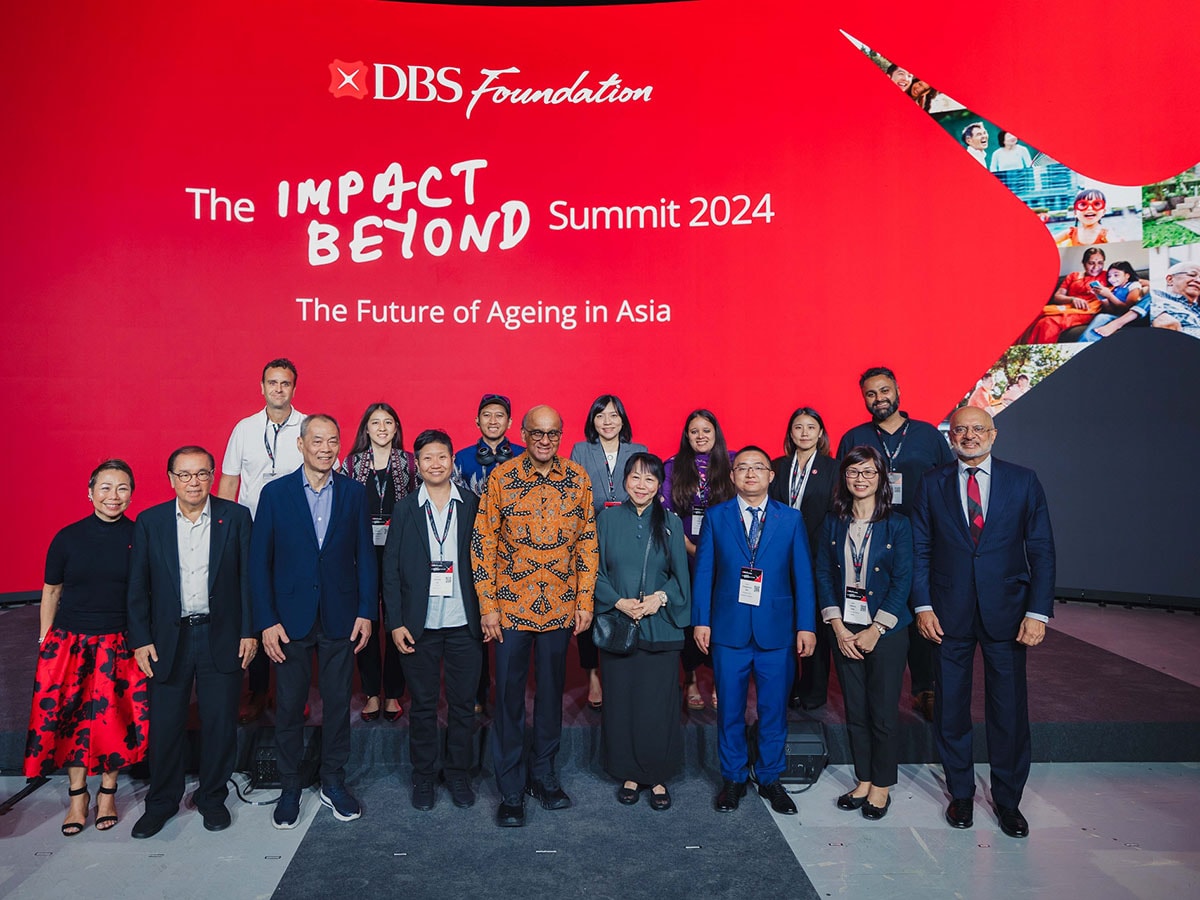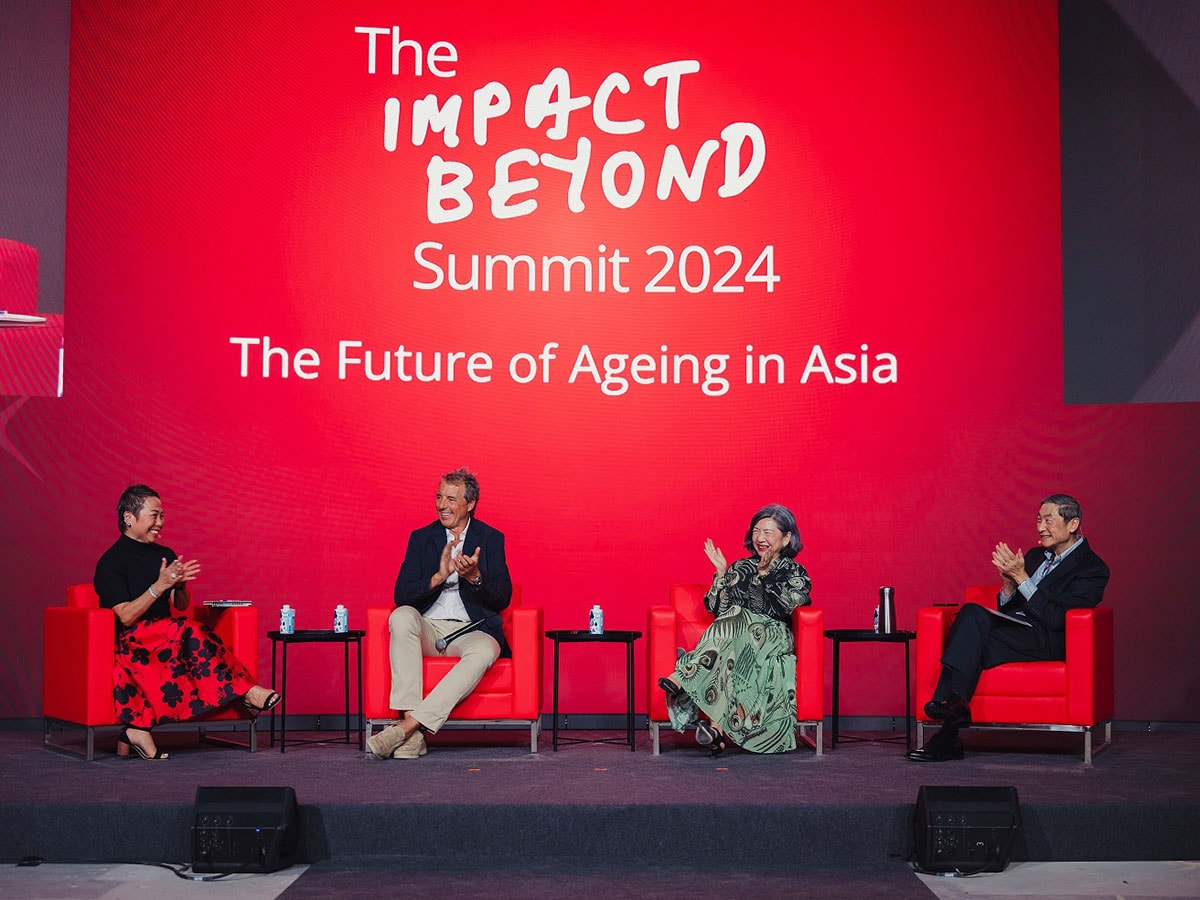The Foundation marked 10 years with the Summit, which also flagged off its intent to invest in solutions for ageing societies. It was part of their commitment up to S$1 billion for the next decade starting 2024, along with plans for over 36,000 employees of DBS Bank. Of this, the Foundation will deploy S$88 million in 15 initiatives that will enable better access to essential needs and foster inclusion among vulnerable communities. These initiatives stand to impact around two million people by 2027, taking DBSF’s total impact to 9.8 million people since it was founded in 2014.
The Foundation also announced a total of S$3 million prize for three businesses (each to get up to S$1 million) that come up with innovative ideas—technological and otherwise—to tackle urgent challenges faced by ageing societies. Applications for the award are open until November 30.
While India has a demographic dividend of a large young population, a section of its population is also rapidly greying. By the next two decades, the elderly population will likely surpass the population of children (aged 0 to 15 years) in the country, says the United Nations Population Fund (UNFPA), in its 2023 India Ageing Report. The population of elderly people (aged above 60) is estimated around 15 crore at present, and is expected to reach close to 35 crore in 2050. The report adds that around 40 percent of this elderly population will witness the loss of financial security and be in the “poorest wealth quintile”, while about one-fifth, or 18.7 percent, will have no income at all.
Karen Ngui, head of the DBS Foundation, says the board of directors identified ageing as one of the “wicked problems” impacting society. The Foundation aims to find and support solutions that include not only aged individuals but also their caregivers. “We want to look at the health span of the aged rather than just their life span, tackling mental, physical, financial, and social challenges,” she adds. “Our goal is to promote inter-generational care that will help integrate them with society rather than isolating them.”
While India may not yet be a super-aged society like several other markets in Asia, it is still home to a significant number of seniors, Ngui says. “Therefore, we aim to work with like-minded partners to help extend India’s ‘living spans’, that is enabling life spans and health spans to move in tandem.”
India is one of the six key regions for the Foundation, the others being Singapore, Hong Kong, China, Indonesia and Taiwan. While in its first decade the Foundation focussed more on social enterprises and small-and-medium-sized enterprises (SMEs), in the next 10 years, it will also ramp up support for non-profit organisations and other ecosystem partners for deeper social impact, Ngui tells Forbes India. According to her, the corporate social responsibility (CSR) regulations in India, which are one of a kind in Asia, facilitate corporates’ and corporate foundations’ efforts to implement their plans and programmes in a more structured manner.
 President of the Republic of Singapore Tharman Shanmugaratnam; Ms Jane Ittogi; representatives from DBS and DBS Foundation; and the 10 DBSF honourees.
President of the Republic of Singapore Tharman Shanmugaratnam; Ms Jane Ittogi; representatives from DBS and DBS Foundation; and the 10 DBSF honourees.
In the last 10 years, the Foundation has supported around 40 social enterprises in India through grants, accelerator partnerships and mentoring. Two of them—Haqdarshak and S4S Technologies—were honourees at the Summit for demonstrating significant scale and impact.
Aniket Doegar co-founded Haqdarshak to help the rural poor and micro businesses access welfare schemes. He says India has over 20,000 schemes offered by central, state and local governments, but citizens are often unaware of what they qualify for, or how to apply. When there are not enough people applying for schemes, crores of rupees stand to remain unspent. Since it was founded in 2016, Haqdarshak has helped close to 65 lakh people access welfare schemes. “There are 7,000 active government schemes on our system in 14 local languages,” he says.
Its business model involves onboarding people on to a platform. Since not everyone has access to technology, the enterprise has deployed field agents, mostly women, to help people. As of today, they have trained around 40,000 women, around 10,000 of whom are actively working in their local communities.
Also read: The CMO Survey: Marketers spend on new technologies as they battle usage and impact
So far, Haqdarshak has raised around Rs20 crore in equity and Rs9 crore in debt towards working capital funding. Their association with DBS Foundation, one of their biggest corporate foundation partners, began in 2017. In 2020, with the help of their Covid relief grant, Haqdarshak launched a platform to support MSMEs and small businesses, which has reached 100,000 beneficiaries so far.
Doegar is now working on a project with DBS to help people with financial inclusion, digital literacy and access to schemes. While the first part of the programme reached around 200,000 families, mostly women, the next leg of support aims to reach a million families.
“We barely had a business plan when we met with DBS in 2018. It was a gruelling interview process, but conversations, support and insights from the team helped shape our business model and scale up to where we are today,” says Nidhi Pant, co-founder, S4S Technologies. Her startup provides solar-powered dehydrators to women farmers to help them increase the shelf life of agricultural produce.
Today, they work with around 3,000 women farmers in Maharashtra, Odisha and Andhra Pradesh, who use the dehydrators to remove the moisture content and reduce post-harvest losses. Pant’s startup also provides them with tools to process and package the produce, and helps sell it to large clients like the Indian Railways and Sodexo, FMCG companies like Nestlé, Marico, Capital Foods, and even export the produce to Bangladesh, Sri Lanka and Indonesia. Her technologies have helped them save 60,000 tonnes of produce annually, and supplemented farmer income to Rs50,000 to Rs60,000 per year.
Ngui says the intent of the Foundation’s funding is to spark a multiplier effect, as is seen in the cases of Haqdarshak and S4S. In their next decade of operations in India, the Foundation wants to focus on two broad areas: First is ‘Providing Essential Needs’, which include funding solutions or organisations that improve access to food and nutrition, education, health care (including mental health). The second area is ‘Fostering Inclusion’, which will look at financial and digital literacy.
“We want to help uplift vulnerable communities and there isn’t a one-size-fits-all solution, given that there are many urgent, competing social issues that need attention in India,” says Claire Wong, lead (Business for Impact), DBS Foundation. “While many startups in India use technological innovations to expand reach for communities to have access to health care, welfare schemes and education, these have to be complemented with feet on the ground to reach people in the local communities. So, our approach has been to have a mix of both online and offline business models,” she tells Forbes India.
(The writer was in Singapore on invitation from the DBS Foundation to attend the Impact Beyond Summit)
 DBS Foundation hosts the inaugural Impact Beyond Summit on ageing societies.
DBS Foundation hosts the inaugural Impact Beyond Summit on ageing societies. 
